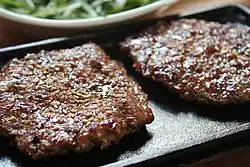Tteok-galbi
Tteok-galbi (떡갈비) or grilled short rib patties is a Korean beef dish made with minced beef short ribs.[1] Originally a royal dish, tteok-galbi is now a local specialty of Gyeonggi Province in the central-west region and South Jeolla Province in the south-west region of the Korean Peninsula.
 | |
| Alternative names | Grilled short rib patties |
|---|---|
| Type | Galbi, patty |
| Place of origin | Korea |
| Associated national cuisine | Korean cuisine, Korean royal court cuisine |
| Korean name | |
| Hangul | 떡갈비 |
|---|---|
| Revised Romanization | tteok-galbi |
| McCune–Reischauer | ttŏk-kalbi |
| IPA | [t͈ʌk̚.k͈al.bi] |
Etymology
Tteok-galbi (떡갈비), literally translated to "cake ribs" as tteok (떡) means "rice (or other grain) cake" and galbi (갈비) means "rib". The name comes from the food's similarity in appearance to tteok.[2] The process of kneading and shaping the meat is similar to the process of making a rice cake.[3] The final dish is also soft and tender, much like a rice cake in texture.
The word tteok-galbi has a relatively short history that starts in the late 1960s to early 1970s.[4] Before that, the dish was called hyo-galbi (효갈비), meaning "filial piety ribs", or no-galbi (노갈비), meaning "elder ribs", as it was often a dish for older people whose teeth were too weak to bite off meat from the rib bones.[4] Both the terms hyo-galbi and no-galbi were used during the Joseon era (1392–1897).[4]
History
Tteok-galbi was a beef dish in Korean royal court cuisine.[2] One story says the dish was created because it was not befitting for kings to gnaw on galbi-gui (grilled short ribs).[2] Recipes from Gyeonggi Province that char-grill the beef are said to have been imparted from court ladies in the late Joseon era, while the recipes from South Jeolla Province were reportedly passed on by scholarly-officials in exile.[2] The Damyang tteok-galbi, passed on by Song Hui-gyeong (1376–1446) is the most famous among them.[2]
In modern South Korea, tteok-galbi is also made with ingredients mixed with or other than beef, such as pork and duck. Tteok-galbi made with half beef and half pork was first created and sold by Choe Jeo-ja in the 1950s, in Songjeong, Gwangju, South Korea.[2] Now there is a "tteok-galbi street" specializing in the half beef and half pork dish in the Songjeong area.[2] Ori-tteok-galbi (오리떡갈비), made with duck meat, is a popular dish in Gwangju.[5]
Preparation
Meat is separated from beef short ribs, finely minced, and marinated with various seasonings and aromatics, such as salt, ground black pepper, ginger juice, soy sauce, minced garlic, minced onion, cheongju (rice wine), sugar, and sesame oil.[6] The marinade is boiled, sifted, and cooled beforehand.[6] The marinated meat is shaped and attached back to the rib bones using a small amount of wheat flour as glue, and char-grilled over oak.[2][6] Once on the gridiron, the meat patty is brushed with the sauce while it is grilled.[6]
Songjeong tteok-galbi is made by shaping a mixture of beef and pork into rectangles and grilling. Pork is added to make it fattier since the beef is too dry by itself.[2] The recipe of Choe Jeo-ja calls for hand-kneading the meat for a long time in a seasoning made from nearly 20 ingredients including dasima (kelp), pear and honey.[2] The sauce is intermittently brushed on the meat while it is slowly grilled over charcoal.
Eating
Chopsticks are used to cut tteok-galbi.[7]
See also
References
- National Institute of Korean Language (30 July 2014). "주요 한식명(200개) 로마자 표기 및 번역(영, 중, 일) 표준안" (PDF) (in Korean). Retrieved 22 February 2017. Lay summary – National Institute of Korean Language.
- "Tteok-galbi" 떡갈비. Korean Food Foundation (in Korean). Retrieved 2 August 2017.
- Ro, Hyo-sun (26 June 2015). "Tteokgalbi (short rib patties)". The Korea Herald. Retrieved 2 August 2017.
- 이, 석희 (5 May 2009). "[백년명가②] 떡갈비, 조선시대에는 '효갈비' 라고 불렀다". The Daily Sports (in Korean). Retrieved 2 August 2017.
- 이, 석희 (5 May 2009). "[백년명가⑥] 오리로 떡갈비를 만들어요?". The Daily Sports (in Korean). Retrieved 2 August 2017.
- "Tteok-galbi" 떡갈비. Doopedia (in Korean). Doosan Corporation. Retrieved 2 August 2017.
- Bartholomeusz, Rachel (5 May 2016). "Is there a wrong way to use chopsticks?". SBS. Retrieved 2 August 2017.
